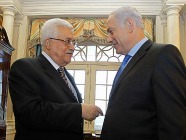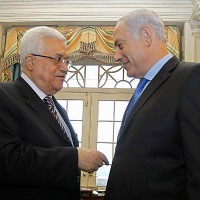
This week, Alpher discusses whether last week's events were a major turning point in the Israeli-Palestinian conflict, if what we are seeing are indeed renewed peace talks, what changed in the Israeli-Palestinian reality to push the leaders to drop some of their conditions, accept others, and agree for their negotiators to meet, why these negotiations are different from all previous negotiating attempts between Netanyahu and Abbas, and why the EU decision, if its economic impact is limited, is significant.
Q. Were last week's events a major turning point in the Israeli-Palestinian conflict?
A. Two spectacular developments were registered last week: (in chronological order) first, the European Union decision that future research-financing agreements with Israel would not apply to the West Bank, East Jerusalem and the Golan Heights; and second, Secretary of State John Kerry's breakthrough agreement to restart final status talks. It is much too early to know where either process will go. But they are both important.
Q. Let's start with the renewed peace talks. Perhaps more prudently, are these indeed renewed peace talks?
A. Technically, not yet. The parties have agreed to meet in Washington, apparently next week, to put together an agenda for the talks, rather than to commence the talks. This stipulation enabled Kerry to persuade Palestinian leader Mahmoud Abbas (Abu Mazen) to at least temporarily drop preconditions like a settlement freeze and Israeli agreement to negotiate on the basis of the 1967 lines. (Kerry did succeed in persuading PM Netanyahu to release upwards of 100 veteran prisoners once negotiations are under way.) But those demands are likely to resurface in the Washington talks, creating yet more early challenges for Kerry's very persistent diplomacy.
Q. What changed in the Israeli-Palestinian reality to push the leaders to drop some of their conditions, accept others, and agree for their negotiators to meet?
A. On the Israeli side, Netanyahu was undoubtedly influenced by the EU decision regarding settlements, insofar as the many predictions that Israel would be internationally isolated over the settlements issue appeared finally to be reaching fruition. Even if the immediate economic ramifications of this initial decision are relatively minor, the writing is now clearly on the wall, reinforced by Kerry's apparent rebuff of Netanyahu's request that he ask the EU to postpone implementation.
Netanyahu still has to get the approval of his government for the prisoner release. This is a highly controversial issue among the Israeli public, where a strong lobby of the families of victims of terrorism will oppose it emotionally. Still, he is likely to succeed. But approval for any further negotiating concessions will be much more difficult, and could oblige him to reorganize his coalition: Jewish Home out, Labor in. He has also proposed a controversial referendum for any final status agreement he reaches; the extreme right wing supports this idea in the belief that it can sway Israeli public opinion with patriotic and religious appeals when the time comes.
Then too, Netanyahu's tactical approach to renewed negotiations has consistently been to welcome them without preconditions, even as he continues to approve settlement construction and to advertise his hard-line positions. Kerry's real challenge was to persuade a skeptical Abbas that renewing talks in this reality was worthwhile.
Q. So what changed Abbas' mind?
A. Abbas was caught between two waves of pressure. On the one hand, within his own PLO and especially Fateh there is growing opposition to Israeli-Palestinian contacts in general ("normalization"), whether informal or formal. Then there were Abbas' own preconditions that had not been accepted publicly: a settlement freeze and the 1967 lines.
On the other hand, Abbas faced heavy Arab pressure in the form of Arab League endorsement of Kerry's negotiating plan. American pressure took the form of generous financial inducements in return for negotiating, coupled with threats to withhold existing US financial support if Abbas refuses. The EU decision regarding the settlements, which Palestinian extremists interpreted as support for their boycott position, was apparently understood by Abbas quite differently: as a positive signal regarding activist European support. Moreover, Abbas has apparently received reassurances from Kerry regarding an informal settlement freeze and Washington's acceptance (if not Israel's) of the 1967 lines as the departure point for territorial negotiations.
Abbas also presumably took into account events in Egypt: the Muslim Brotherhood's setback there has weakened Hamas in Gaza, thereby improving Abbas' internal-Palestinian and inter-Arab negotiating position. Then too, Abbas' agreement not to seek to again upgrade the Palestinian diplomatic profile at the United Nations in September is a concession he can always retract; what's more, there is a school of thought among Palestinians that this internationalizing tactic has in fact produced few dividends.
In any event, Abbas' agreement to send Saeb Erekat to Washington to "negotiate about negotiating" must be understood as conditional. Erekat will undoubtedly try to hold out in his talks with Tzipi Livni and Yitzhak Molcho for Abbas' remaining conditions--the 1967 lines and a settlement freeze--to be fleshed out. Those conditions are particularly relevant insofar as Kerry proposes, and the two sides apparently agree, that negotiations focus first on territories and security. Netanyahu, for his part, has contrived to delay the first round of prisoner releases until early August, and will undoubtedly balk regarding the prisoner issue if any attempt is made to get him to mouth the words "1967 lines".
Q. Why are these negotiations different from all previous negotiating attempts between Netanyahu and Abbas?
A. This is a question that will occupy analysts in the weeks and months ahead. After all, in 2010, after a prolonged settlement freeze, Netanyahu and Abbas did launch a very brief process that included a meeting between the two, under the direct sponsorship of US President Barack Obama and the mediation of George Mitchell. Last year, Netanyahu's emissary Molcho met in Amman several times with Erekat. Recently, Fateh leader Yasser Abed Rabbo revealed that he had held a series of clandestine meetings with Netanyahu's representatives to discuss peace possibilities.
One obvious difference this time around is Kerry's dogged determination, which has impressed all sides. Another is that Netanyahu has apparently softened some of his negotiating positions; for example, he no longer seems to insist, as he told Abbas in 2010, that Israel would remain in the Jordan Valley for another 40 years, but rather suggests an Israeli military presence there without sovereignty. Netanyahu has also spoken openly of late of the demographic danger to Israel of remaining in the West Bank--ostensibly another softer position. And Tzipi Livni, a vocal advocate of a compromise two-state solution, is returning to negotiations. On the other hand, the coalition Netanyahu put together after January's Knesset elections is, despite Livni's presence, even more settler-friendly and anti-two-state-solution than its predecessor.
Moreover, as far as we know, Abbas has not softened any of his negotiating positions, and on issues of substance the two sides remain as far apart as ever. Taken together, all this invites cynical explanations: Netanyahu has agreed to talks only to avoid antagonizing the Obama administration due to considerations related to Iran; he has no expectations of success, hence is not concerned that his coalition will be put to the test; Abbas needs Arab and American money to hold the Palestinian Authority together. One Israeli commentator likened the new process to a reality show in which the object is to make sure the other side is seen as the "spoiler".
Q. The prospects are really that bad?
A. There seems to be broad agreement in many quarters that in view of the substantive gaps separating the two sides on issues like Jerusalem and the right of return, an end-of-conflict-end-of-claims agreement based on the Oslo parameters is not currently within reach. This explains why Kerry, following Obama's earlier lead, wants the talks to focus initially on two of the more "doable" issues, borders and security. Yet both sides remain declaratively committed to the "nothing is agreed until everything is agreed" mantra that has thwarted negotiations repeatedly for nearly 20 years.
Hence I believe the real challenge facing Kerry, and Martin Indyk if he is indeed appointed the US peace coordinator, is how to extract from this almost impossible situation some sort of interim progress on the territorial issue, such as an Israeli withdrawal from around 20 percent of Area C and perhaps an integrated security arrangement for the Jordan Valley that involves Jordanian forces as well as Israeli and Palestinian. The US would have to find persuasive ways to convince Abbas that an interim step forward is not the end of the process. Netanyahu would have to persuade the strong settler contingent within his coalition and his own party that there are compelling regional and demographic reasons for doing this and that the alternatives are worse.
This might conceivably be doable. Alternatively, if and when the negotiations deadlock, or even at an earlier stage, Kerry might present a set of American compromise guidelines. At that point, the question will be how much pressure the US backs this initiative up with. Based on historical precedents, if the pressure is serious one outcome could be an Israeli unilateral withdrawal initiative designed to deflect the pressure and avoid a final-status map that Netanyahu rejects.
Q. Finally, could you return to the EU decision and explain why, if its economic impact is limited, it is significant?
A. The European Union is Israel's biggest trading partner, accounting for fully $40 billion in exports and imports in 2011. The future of Israel's bonanza natural gas discoveries in the eastern Mediterranean is linked to EU member Cyprus. "European-ness" is also the aspiration of many Israelis, not to mention Europe as their vacation destination. So Israelis always knew that if and when the EU decided to "get tough" and put muscle behind its long-term disapproval of the settlements, they would have to take notice. Accordingly, it's hard to take seriously the surprise at the EU measure displayed by Netanyahu and his ministers who deal with economic issues, unless they really are living in an ideologically-driven self-delusional "bubble" regarding their capacity to build settlements yet ignore and belittle the world's anger forever.
True, the current action is minor: it is a bureaucratic directive that obligates the EU, but not its 28 member states, to insist that EU R & D grant agreements with Israel stipulate that they do not apply to the settlements. Because the decision was taken at the bureaucratic and not political level, it applies, rather improbably, to the Golan Heights as well as the West Bank and East Jerusalem, even though no amount of pressure in the world could currently generate an Israeli-Syrian peace process.
If an Israeli government institution signs on to the EU conditions in order to gain funding, it will effectively be admitting that the West Bank and East Jerusalem are occupied and not "disputed" territories and that the 1967 lines are valid. Also significant here is the precedent of genuine EU pressure; more might follow.
Finally, there is the effect on the Israeli consciousness. The settler leaders and boosters who say Israel is not isolated and not threatened by international boycott will now be treated more skeptically by the public. The Israeli peace camp leaders who have long predicted economic boycott and isolation will now be treated more credibly.
